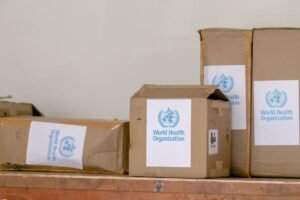Of the nearly 2700 active Covid cases reported nationally, Kerala accounts for 87% of them as of 21 December. There were 300 fresh cases reported along with 3 deaths related to COVID, according to the Union Ministry of Health and Family Welfare.
It is yet to be tested if the deaths were related to the new JN.1 subvariant of the virus that was first detected in Thiruvananthapuram in a 79-year-old woman. JN.1 is said to be a mutation of the omicron variant. WHO has classified it as a variant of interest and the IMA Covid Task Force has suggested that the variant can be challenging for senior citizens and people with co-morbidities.
Kerela’s Health Minister, Veena George has stated that though this variant might have more transmissibility, it is less severe. She has also added that the state has the situation under complete control.
It has also been reported that those who were vaccinated less than a year ago are less likely to be severely affected in comparison with those vaccinated more than a year ago.

Covid JN.1, a cause for alarm?
Dr. Soumya Swaminathan, the former Chief Scientist of the WHO has reassured the public that there is currently no cause for alarm emphasizing that the identified variant is classified as a “variant of interest” rather than a “variant of concern.” She stressed the importance of exercising caution and adopting appropriate preventive measures highlighting the absence of data that indicates increased severity or higher mortality rates associated with the JN.1 variant. She has encouraged people to adhere to the already established preventive measures and has urged people to remain vigilant in the evolving situation.

There are five factors to determine when a COVID-19 situation becomes serious according to Dr. Chandrakant Lahariya, a leading public health and policy expert, and healthcare professional Sabine Kapasi had listed a few factors that could hint at an alarming COVID-19 situation.
The factors to look out for are:
- New mutations and/or clustered cases in an area.
- Rise in the severity of the infection.
- Shift in symptoms of Covid-19
- Rise in hospitalisation
- Increase in mortality.
Therefore, while there is an upsurge in COVID cases due to the JN.1 variant, “there is no increase in serious diseases (those infected have mild cough and fever)”, NITI Aayog member-Health VK Paul said.
JN.1 & Covid situation in Singapore
In the last week, Singapore witnessed a sudden surge in new COVID-19 cases, rising from 763 to 965 compared to the previous week. Currently, the count of patients requiring intensive care unit admission increased from 23 to 32 during the same period. This will be the highest weekly number of new hospitalizations and ICU admissions for COVID-19 patients in the year 2023, as reported by TODAY newspaper on Thursday. Notably, a significant portion of the virus cases in Singapore is attributed to the JN.1 variant.










